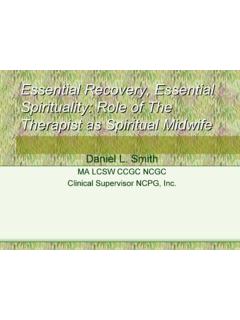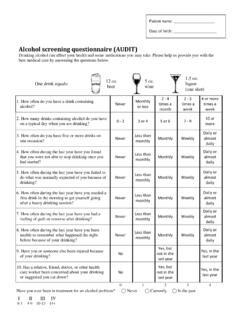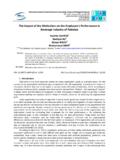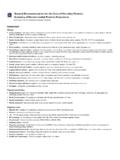Transcription of MOTIVATIONAL INTERVIEWING QUESTIONNAIRE
1 Pre-Conference Training / Speck Day 1 August 13, 2008. MOTIVATIONAL INTERVIEWING QUESTIONNAIRE . 1. The following are other words that describe the concept of _____. Confrontation Fight Battle Struggle Conflict Opposition 2. MOTIVATIONAL INTERVIEWING is a directive, client centered counseling style for eliciting behavior change by helping clients to explore and resolve _____. 3. How many phases are there in MOTIVATIONAL INTERVIEWING ? a. 7 b. 2 c. 3 d. 5. 4. Ambivalence about change is _____. 5. O in OARS stands for: Asking _____ -ended questions. 6. In the Stages of Change model, Pre-contemplation is another word that replaces a. directive b. ambivalence c. denial d. personal freedom 7. Why is MOTIVATIONAL INTERVIEWING useful in working with many populations because (Please mark T or F): T F. ___ ___ MOTIVATIONAL INTERVIEWING aligns with evidence-based practice. ___ ___ It can help the counselor get "back into the game" of behavior change.
2 ___ ___ It suggests effective tools for handling resistance and can keep difficult situations from getting worse. ___ ___ It can help the counselor get "back into the game" of behavior change. ___ ___ It keeps the counselor from doing all the work, and makes interactions more change-focused ___ ___ It helps prepare people for change. ___ ___ MOTIVATIONAL INTERVIEWING changes who does the talking. ___ ___ It allows counselors to keep the client accountable with a positive MOTIVATIONAL style. 2008 Midwest Conference on Problem Kate Speck, PhD, MAC LADC 1. Gambling and Substance Abuse Pre-Conference Training / Speck Day 1 August 13, 2008. General Principles Underlying MOTIVATIONAL INTERVIEWING Develop Discrepancy Express Empathy Amplify Ambivalence Roll With Resistance Support Self-Efficacy Major MOTIVATIONAL Strategies: OARS. Open-ended questions Affirmations Reflections Summaries 2008 Midwest Conference on Problem Kate Speck, PhD, MAC LADC 2.
3 Gambling and Substance Abuse Pre-Conference Training / Speck Day 1 August 13, 2008. How it Works Set the agenda Having clarified the agenda around which there is ambivalence ask for 20 minutes or so to try a series of special questions to help sort things out. Ask about the positive aspects of use. This is often an engaging surprise for the addict. However, it will only work if you are genuinely interested. What are some of the good things about _____? People usually use _____ because they help in some way. How has it helped you? What do you like about the effect? ( Summarize positives). Ask about the less good things: Can you tell me about the down side? What are some aspects you are not so happy about? What are some of the things you would not miss? Use praise; you have done well to have survived. Life Goals- These goals will be the pivotal point against which cost and benefits are weighed. What sort of things are important to you?
4 What sort of person would you like to be? If things worked out in the best possible way for you, what would you be doing a year from now? Ask for a decision Reinstate their dilemma or ambivalence then ask for a decision. You were saying that you were trying to decide whether to continue or cut down . After this discussion, are you more clear about what you would like to do? So have you made a decision? Goal setting Use SMART ( Specific, Meaningful, Assessable, Realistic, Timed). 2008 Midwest Conference on Problem Kate Speck, PhD, MAC LADC 3. Gambling and Substance Abuse Pre-Conference Training / Speck Day 1 August 13, 2008. What will be your next step? What will you do in the next one or two days? Have you ever done any of these things before to achieve this? Who will be helping and supporting you? On a scale of 1 to 10 what are the chances that you will do your next step? (anything under 7 their goal may need to be more achievable).
5 IF NO DECISION OR DECISION IS TO CONTINUE TO USE DRUGS. If no decision, empathize with difficulty of ambivalence. Ask if there is something else which would make a decision? Ask if they have a plan to manage not making a decision? Ask if they are interested in reducing some of the problems while they are making decision? IF DECISION TO USE. Ask if they are interested in reducing some of the problems? Use problem solving 2008 Midwest Conference on Problem Kate Speck, PhD, MAC LADC 4. Gambling and Substance Abuse Pre-Conference Training / Speck Day 1 August 13, 2008. GOAL: EXPLORING CONCERNS & OPTIONS FOR CHANGE. Once the subject is out in the open, the goal needs to be assisting the client to express how they feel about the issue - and more importantly, whether they have any concerns about it. Options for change if needed should come at a later time. The following summary of strategies is your menu to use as options available to you as an interviewer.
6 Because you have no idea at this early stage of the person's readiness for change, it is best to begin with non-threatening strategies. 1. Ask about the problem in detail. 2. Ask about a typical day. 3. Ask about lifestyle and stresses. 4. Ask about health, then substance use. 5. Ask about the good things, then the less good things. 6. Ask about the problem in the past and now. 7. Provide information and ask What do you think? . 8. Ask about concerns directly. 9. Ask about the next step. Wind things up by summarizing the conversation in you language. Emphasize freedom of choice and your willingness to provide further support. 2008 Midwest Conference on Problem Kate Speck, PhD, MAC LADC 5. Gambling and Substance Abuse Pre-Conference Training / Speck Day 1 August 13, 2008. Evoking Change Talk STATEMENTS. Open Ended Questions 1. Problem Recognition What things make you think that there is a problem you had in relation to your drug use?
7 What difficulties have you had in relation to your drug use? In what ways do you think other people have been harmed by your drinking? In what ways has this been a problem for you? How has your use stopped you from doing what you want to do? 2. Concern What is it about your drinking that you or other people might see as reasons for concern? What worries you about your use? What can you imagine happening to you? How do you feel about your gambling? How much does that concern you? In what ways does this concern you? 3. Intention to change The fact that you're here indicates that at least you think it's time to do something. What are the reasons you see for making a change. What makes you think that you need to make a change. If you were 100% successful and things worked out exactly as you would like, what would be different? What things make you think you should keep drinking the way you have been?.. And what about the other side?
8 What makes you think it is time for a change? What are you thinking about your gambling at this point? What would be the advantages of making a change? I can see you're feeling stuck at the moment. What's going to have to change. 4. Optimism What makes you think that if you did decide to make a change, you could do it? What encourages you that you can chance if you want to? What do you think would work for you, if you decided to change? 2008 Midwest Conference on Problem Kate Speck, PhD, MAC LADC 6. Gambling and Substance Abuse Pre-Conference Training / Speck Day 1 August 13, 2008. RATIONALE. These open questions evoke client s verbal processing of MOTIVATIONAL statements. Reinforce even if the statements are tentative with head nods, or supportive statements such as: I can see how that would be a concern to you. or That must be difficult for you . Whether a client will continue offering change talk statements and exploring ambivalence and discrepancy depends largely on how you respond.
9 Once they see acceptance, it reinforces and encourages continued exploration. After this you can begin the general format of being straightforward by using What else questions. WHAT ELSE QUESTIONS. What else have you wondered about? What other concerns have you had? What are some other reasons why you may need to make a change? What other things have people told you? What other problems have you had? What else worries you? 2008 Midwest Conference on Problem Kate Speck, PhD, MAC LADC 7. Gambling and Substance Abuse Pre-Conference Training / Speck Day 1 August 13, 2008. MOTIVATIONAL INTERVIEWING Guide Sheet - Reflections Simple reflection The simplest approach to responding to resistance is with nonresistance, by repeating the client's statement in a neutral form. This acknowledges and validates what the client has said and can elicit an opposite response. Client: I don't plan to quit drinking anytime soon. Professional: You don't think that abstinence would work for you right now.
10 Amplified reflection Another strategy is to reflect the client's statement in an exaggerated form--to state it in a more extreme way but without sarcasm. This can move the client toward positive change rather than resistance. Client: I don't know why my wife is worried about this. I don't drink any more than any of my friends. Professional: So your wife is worrying needlessly. Double-sided reflection A third strategy entails acknowledging what the client has said but then also stating contrary things she has said in the past. This requires the use of information that the client has offered previously, although perhaps not in the same session. Client: I know you want me to give up drinking completely, but I'm not going to do that! Professional: You can see that there are some real problems here, but you're not willing to think about quitting altogether. Shifting focus You can defuse resistance by helping the client shift focus away from obstacles and barriers.










